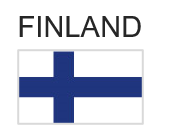The table below aims at gathering the administrative and governmental bodies of Finland, which are responsible for digital public administration policies and interoperability policies.

National
The Ministry of Finance ensures the stability of the general government finances and the financial markets, and works to provide for good governance, functioning public services and the structural development of public administration.
The Ministry of Finance’s Public Sector ICT Department provides the preconditions for the digitisation of the public sector and a better utilisation of data in society. It prepares information and administrative policies, steers public sector information management, and deals with the interoperability of shared information pools of public administration, joint support services and service provision. It also steers the general criteria for information security. The department takes actively part in the work of international organisations, and follows digitisation and ICT developments in other countries by seeking comparative data and experiences.
The Information Management in Public Administration Board, which assesses the implementation of the requirements of the Act on Information Management in Public Administration, operates in connection with the Ministry of Finance.
|
Jarkko Levasma Director General, Public Sector ICT Department
|
The Ministry of Transport and Communications is responsible for the provision of safe and secure transport and communications connections and services, while also enabling the use of new digital services. The aim is to create a favourable operating environment for new services and business models.
The responsibilities of the Ministry of Transport and Communications include strategic development, steering and legislation related to (i) infrastructure, i.e. communications networks, network licenses and broadband connections, as well as digital services, use of data and automation in the transport and energy efficiency sectors; and (ii) cyber and information security, privacy protection and confidentiality of data.
The Ministry of Economic Affairs and Employment creates the conditions for an economically, socially and ecologically sustainable growth. The Ministry prepares the industrial policy, as well as the innovation and technology policy, including with regard to the internationalisation of enterprises and technical safety. The responsibilities of the Ministry include strategic development, steering and legislation related to e.g. the functioning of markets, the promotion of competition and consumer policy, and regional development and cooperation areas for regional councils.
The Coordination Group for Digitisation is an interministerial working group tasked with strengthening interministerial cooperation, coordination and flow of information. It supports the work of the Ministerial Working Group on Advancing the Digital Transformation, the Data Economy and the Public Administration. Its duties include maintaining awareness of the situation regarding the digital, data and information policy, and promoting the digital transformation and the data economy. The group is chaired by the Ministry of Transport and Communications, the Ministry of Finance, and the Ministry of Economic Affairs and Employment.
In September 2020 the Ministry of Finance appointed a high-level Technology Advisory Board to work until December 2023. The goal is to define a technology policy that will create wellbeing and boost competitiveness in Finland.
In June 2021 the Board published a report proposing three tools to implement the technology policy, together with three structural reforms and about 40 measures. Based on this report, in April 2022, the Ministries published a Government Resolution on Technology Policy.
The Digitalisation for Every-day Life Advisory Board (Digi arkeen-neuvottelukunta) was set up in early 2017 to act as a cooperation and dialogue channel between civil society organisations (CSOs), researchers and Ministries, including the Ministry of Finance, which is responsible for the digitalisation of public services. The Advisory Board’s task was to highlight concerns about the digitalisation of services and help ensure that everyone is able to make the most of the opportunities offered by digitalisation. Attention was paid to ensuring the accessibility of digital services, developing the methods of authentication for digital services and exploring how digitalisation affects people’s daily lives. The Advisory Board’s term ended at the end of March 2023 and an activity report summarising its activities was published.
Pursuant to the Act on Information Management in Public Administration (906/2019), the Ministry of Finance is responsible for arranging cooperation relating to information management in public administration and production of ICT services. In the autumn of 2020, the Ministry of Finance appointed the Advisory Boards that monitor changes and developments in digitalisation, information management and ICT services in public administration. The Advisory Boards assess the impacts of these changes on the tasks of public administration, and on service and administrative structures.
The Ministry of Finance is supported in its steering and supervision tasks by the Advisory Committee on the Government Security Network, established by the government for a fixed term. The Advisory Committee is led by the Ministry of Finance with representation from at least the Ministry of Finance, the Prime Minister’s Office, the Ministry for Foreign Affairs, the Ministry of the Interior, the Ministry of Defence, the Ministry of Transport and Communications, the Ministry of Social Affairs and Health, the Finnish Defence Forces, the National Emergency Supply Agency and the Association of Finnish Local and Regional Authorities (ALFRA). The Advisory Committee’s task is to participate in the drafting of decrees, orders and decisions issued based on the provisions contained in the Government Security Network Activities Act, and in other matters related to the steering and supervision of the government security network activities.
The Digital and Population Data Services Agency appointed the Public Sector Digital Security Management Board (VAHTI) as a functional-level multi-actor steering group in February 2020. The Board includes senior officials and management of central public agencies as well as representatives of the key digital security entities and bodies. It advances collaboration between the functional-level authorities and with the private sector, as well as competence development. In addition, it guides the VAHTI Expert Network activities and publishes good practices. The Board has been operating for over 20 years.
The Digital and Population Data Services Agency was established by the Digital and Population Data Services Agency Act (304/2019) on 1 January 2020. The Agency was created by merging the Population Register Centre, the Local Register Offices, and the Steering and Development Unit for the Local Register Offices. It belongs to the Ministry of Finance’s branch of government and is responsible for developing shared support eGovernment services (Suomi.fi services) as well as promoting the overall digitisation of the public sector and society, securing the availability of data and providing services for the life events of its customers.
The Government ICT Centre Valtori is a service centre operating under the administrative branch of the Ministry of Finance. It provides sector-independent ICT services for the central government administration.
The Office of the Data Protection Ombudsman safeguards the rights and freedoms of individuals with regard to the processing of personal data. The Data Protection Ombudsman is a national supervisory authority supervising compliance with data protection legislation.
The organisation of public healthcare, social welfare and rescue services was reformed in Finland and the responsibility for organising these services was transferred from municipalities to Wellbeing Services Counties at the beginning of 2023. The key objective of the reform is to improve the availability and quality of basic public services throughout Finland. Under the reform, a total of 21 self-governing Wellbeing Services Counties were established in Finland. In addition, the City of Helsinki will be responsible for organising healthcare, social welfare and rescue services within its own area.

